|
|
|
Sort Order |
|
|
|
Items / Page
|
|
|
|
|
|
|
| Srl | Item |
| 1 |
ID:
082223
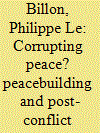

|
|
|
|
|
| Publication |
2008.
|
| Summary/Abstract |
Many conflict-affected countries are among the most corrupt in the world, and corruption is frequently reported as a major concern of local populations and foreign aid agencies during transition to peace. Tackling corruption is part of 'liberal peacebuilding', which seeks to consolidate peace through democracy and free markets economy. Yet liberalization policies may also foster corruption. Using a preliminary analysis of selected corruption perception indicators, this article finds tenuous and divergent support for post-conflict patterns of corruption. Three main arguments linking liberal peacebuilding with higher levels of corruption are then presented for further elaboration, and a research agenda is outlined
|
|
|
|
|
|
|
|
|
|
|
|
|
|
|
|
| 2 |
ID:
062570
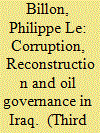

|
|
|
| 3 |
ID:
133111
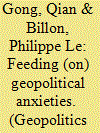

|
|
|
|
|
| Publication |
2014.
|
| Summary/Abstract |
This paper analyses the role of news media in (re)producing geopolitical narratives of food insecurity in relation to the 2007-2008 global food price spike. News content and textual analysis suggests that the media's representation of the food price spike is partly framed by Western geopolitical anxieties of the 'threatening rise of Asia', and features 'fast growing' Asian appetites among the main culprits of the crisis. Seeking to explain the widespread circulation of such representation, this paper analyses media-source relationship within the context of market-driven journalism, and suggests that the changing role of news media has in turn contributed to a rapid and uncritical circulation of elite-based interpretation of, and neoliberal geopolitical approach to, food security. The paper points at the importance of critical enquiries into geopolitical representations of food insecurity and of opening media space for a 'counter-geopolitics of food security'.
|
|
|
|
|
|
|
|
|
|
|
|
|
|
|
|
| 4 |
ID:
061017
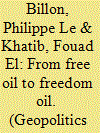

|
|
|
|
|
| Publication |
Spring 2004.
|
| Description |
p109-137
|
| Summary/Abstract |
Oil has been a major driving force behind foreign interests, regional and domestic balance of power, and territorial conflicts in the Persian Gulf. As a result of the '9/11' terrorist attacks debates on oil and the United States' security agenda have significantly shifted. If on one side, those opposing US military interventionism have argued that the 'war on terror' provided one more convenient cover for a renewed 'imperialist oil grab' in this region; on the other, links between oil and terrorism pointed at problems of governance in oil-producing countries. As the 'war on terror' became justified as a 'war of liberation' against oil-funded dictators, the US portrayed its foreign policy as shifting from ensuring free access to oil for the world market, to ensuring that oil is delivering 'freedom' to local populations. Although engaging the crucial issue of oil governance, there is yet little evidence given the number of war victims and potential vested interests that a US policy shift from 'free oil' to 'freedom oil' is genuine and viable.
|
|
|
|
|
|
|
|
|
|
|
|
|
|
|
|
| 5 |
ID:
061005
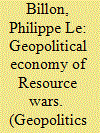

|
|
|
|
|
| Publication |
2004.
|
| Description |
p1-28
|
| Summary/Abstract |
Geopolitical concerns about so-called 'resource wars' have mostly focused on international resource competition, and the vulnerability of resource supply. This article presents an alternative view emphasizing the political and economic vulnerabilitites of resource-dependent states in relation to resource-linked armed conflicts. It then outlines how the geopolitics of resource competition, the history, identity formation, political economy, and characteristics of resource exploitation, as well as the financial opportunities afforded in part by businesses to belligerents can help to understand the geographies of 'resources wars'. Finally, the study suggests that curtailing resource access by belligerents can assist in the termination of conflicts, but that long-term solutions pass through fairer and more accountable political economy of internationally traded resources at both a domestic and global level.
|
|
|
|
|
|
|
|
|
|
|
|
|
|
|
|
| 6 |
ID:
133109
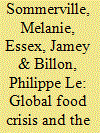

|
|
|
|
|
| Publication |
2014.
|
| Summary/Abstract |
Growing anxieties over food security have recently brought sharp geopolitical overtones to debates about the agro-food sector. Contending that this 'geopolitical moment' highlights the mutually constitutive nature of geopolitics and political economies of food, we examine how dominant geopolitical framings of food security extend and deepen neoliberal models of agro-food provisioning, and highlight the need for further attention to these dynamics from political geographers. We develop a preliminary research agenda for further work in the field, focusing on the recent spate of global farmland acquisitions, questions of agro-food governance, the securitisation of hunger and obesity, and the environmental impacts of dominant agro-food systems. Throughout, we highlight the value of a counter-geopolitics of food security for re-situating agro-food politics outside hegemonic policies and institutions, and of the alter-geopolitics of food pursued by communities embodying concrete alternative food production and consumption systems.
|
|
|
|
|
|
|
|
|
|
|
|
|
|
|
|
| 7 |
ID:
133108
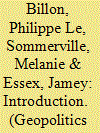

|
|
|
|
|
| Publication |
2014.
|
| Summary/Abstract |
This special issue of Geopolitics focuses on recent shifts in the geopolitics of agro-food systems linked to debates around a new 'Global Food Crisis' and its implications for (trans)national political agendas. Spurred since 2006 by rising food prices, large-scale farmland acquisitions, and growing public protests, these concerns have motivated new streams of development assistance and reforms to global governance processes, as well as strengthened activism by agrarian social movements. While governments and civil society organisations have struggled with how best to address the realities of worsening food insecurity, the discourse of crisis has simultaneously helped to actively reposition food security as an object of urgent geopolitical calculation and strategy. The stubborn grip of continuing poverty and hunger has prompted many observers to envision a future in which chronic food insecurity and associated political and economic disorder are the new normal.
|
|
|
|
|
|
|
|
|
|
|
|
|
|
|
|
| 8 |
ID:
133426
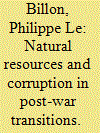

|
|
|
|
|
| Publication |
2014.
|
| Summary/Abstract |
Many 'post-conflict' countries face difficulties in reaping the full benefits of their natural resource wealth for reconstruction and development purposes. This is a major issue given these countries' needs and the risk of seeing 'mismanaged' primary sectors undermine a transition to peace. Bringing together debates about the 'inequality-mistrust-corruption' trap and relationships between natural resources and corruption, this paper suggest that some resource sectors may be more likely to foster inequalities, and thereby increase corruption and distrust, while others are less likely to do so. Reviewing arguments and empirical evidence, I point to the relative importance of transition contexts, stakeholder incentives and resource sector characteristics, and suggest how resource-related corruption may be better understood in relation to trust-building and reconciliation processes.
|
|
|
|
|
|
|
|
|
|
|
|
|
|
|
|
| 9 |
ID:
134288
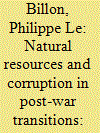

|
|
|
|
|
| Summary/Abstract |
Many ‘post-conflict’ countries face difficulties in reaping the full benefits of their natural resource wealth for reconstruction and development purposes. This is a major issue given these countries’ needs and the risk of seeing ‘mismanaged’ primary sectors undermine a transition to peace. Bringing together debates about the ‘inequality-mistrust-corruption’ trap and relationships between natural resources and corruption, this paper suggest that some resource sectors may be more likely to foster inequalities, and thereby increase corruption and distrust, while others are less likely to do so. Reviewing arguments and empirical evidence, I point to the relative importance of transition contexts, stakeholder incentives and resource sector characteristics, and suggest how resource-related corruption may be better understood in relation to trust-building and reconciliation processes
|
|
|
|
|
|
|
|
|
|
|
|
|
|
|
|
| 10 |
ID:
142154
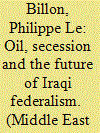

|
|
|
|
|
| Summary/Abstract |
Oil wealth increases the risk of both authoritarianism and secessionist conflict.1 Iraq's 2005 federal constitution sought to address this dual risk by granting regions and provinces a high degree of autonomy and allocating oil revenues according to a mix of demographic and historical-grievances criteria.2 Reflecting a classic conundrum of federalism, the new constitution has both prevented and facilitated secessionism, in part because of an imprecise text allowing for multiple interpretations.3 Born mostly out of demands from Kurdish legislators, Iraqi federalism faced repeated setbacks, reaching a point of crisis in 2014 as a result of widespread grievances towards Nuri al-Maliki's Shiite-dominated regime in Baghdad, major tensions over the distribution of oil revenues, and resurgent Sunni militancy following U.S. military withdrawal. By July 2014, the Islamic State of Iraq and Syria (ISIS) and associated Sunni insurgent groups had taken over much of western Iraq, enacting a de facto partition of the country by declaring the creation of an Islamic Caliphate.4 A breaking apart of Iraq seemed even more likely as the Kurdish Regional Government (KRG) gained control of some of its disputed territories — including oil-rich Kirkuk — consolidated its own oil exports via Turkey, and considered a referendum for independence. By early 2015, the situation had returned to a “new normal”: Shiite politicians still dominated federal institutions, and Shiite oil-rich governorates demanded more direct control over oil revenues; the prospect of an autonomous Sunni region under ISIS rule with limited access to oil revenues had become a reality; and the KRG had regained policy traction in Baghdad and continued to pursue self-sufficiency in oil revenues. Focusing on this latter point, this article outlines some of the oil-related consequences of federalism in Iraq for the Kurdistan region and discusses some of the risks of partition in light of South Sudan's experience with secession.
|
|
|
|
|
|
|
|
|
|
|
|
|
|
|
|
| 11 |
ID:
080378
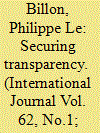

|
|
|
|
|
|
|
|